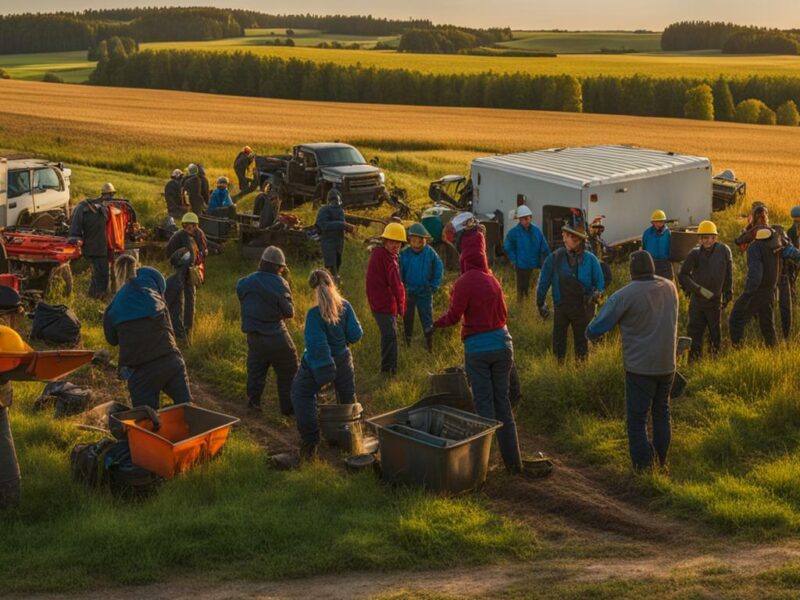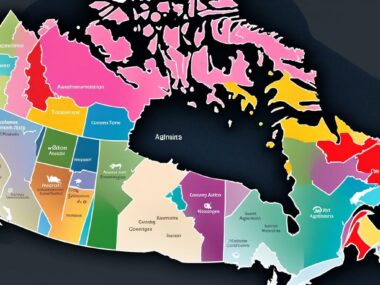Rural communities in Canada are experiencing talent shortages in various sectors, making it an ideal time to explore job opportunities in these areas. The digital economy, agriculture, and tourism sectors are particularly affected by these shortages. However, the Government of Canada is actively working to address these challenges and create more job opportunities in rural communities.
Key Takeaways:
- Talent shortages are prevalent in rural communities across Canada.
- Sectors such as the digital economy, agriculture, and tourism are especially affected by these shortages.
- The Government of Canada has implemented programs to address talent shortages, including labor market transfer agreements, the Women in Skilled Trades Initiative, and the Youth Employment and Skills Strategy.
- The Job Bank is a national employment service that provides job opportunities in rural communities.
- Canadian employers can consider hiring permanent and temporary foreign workers through programs like the Provincial Nominee Program and the Quebec Skilled Worker Program.
Canada’s focus on immigration and talent mobility serves as an inspiration for American organizations facing similar talent shortages. By exploring job opportunities in rural communities, individuals can contribute to the growth and sustainability of these areas while taking advantage of the current market demand.
Understanding the Talent Shortages in Rural Canada
The talent shortages in rural Canada are particularly prevalent in sectors like the digital economy, agriculture, and tourism, creating a demand for skilled workers in these areas. As rural communities continue to grow and evolve, the need for specialized skills becomes more apparent. This presents an opportunity for job seekers looking to explore rural job opportunities and contribute to the development of these communities.
In the digital economy, advancements in technology have opened up new possibilities for remote work, making it easier for skilled professionals to find jobs in rural areas. From software development to digital marketing, there is a wide range of digital roles available, allowing individuals to work from the comfort of their own homes while contributing to the growth of rural communities.
The agriculture sector is another area experiencing talent shortages in rural Canada. As the backbone of many rural communities, agriculture offers various job opportunities, including farming, livestock management, and food processing. Skilled workers in these areas play a crucial role in sustaining local economies and ensuring food security for the nation.
| Industry | Talent Shortages | Job Opportunities |
|---|---|---|
| Digital Economy | Skills in software development, digital marketing, and remote work | Remote digital roles in rural communities |
| Agriculture | Sustainable farming, livestock management, and food processing skills | Jobs in farming, livestock management, and food processing |
| Tourism | Hospitality, guiding, and outdoor adventure skills | Positions in hospitality, guiding, and tourism-related roles |
Tourism is also a sector facing talent shortages in rural Canada. With their unique attractions and natural beauty, rural communities have become popular destinations for tourists. This has created a demand for skilled workers in the hospitality industry, such as hotel management, event planning, and restaurant services. Additionally, outdoor adventure activities like hiking, fishing, and wildlife tours provide opportunities for tour guides and outdoor enthusiasts.
Addressing Talent Shortages in Rural Canada
The Government of Canada has recognized the importance of addressing talent shortages in rural communities. Through programs like labor market transfer agreements, the Women in Skilled Trades Initiative, and the Youth Employment and Skills Strategy, efforts are being made to attract and retain skilled workers in these areas. These initiatives aim to provide training and job opportunities, empowering individuals to contribute to the growth and sustainability of rural communities.
- Labor Market Transfer Agreements: These agreements help bridge the gap between labor supply and demand by facilitating the movement of workers from areas with high unemployment to regions with talent shortages.
- Women in Skilled Trades Initiative: This program aims to increase the representation of women in traditionally male-dominated industries, offering support and training for women seeking employment in rural areas.
- Youth Employment and Skills Strategy: This strategy focuses on providing young Canadians with the skills and job opportunities needed to succeed in rural communities, ensuring a strong workforce for the future.
The Job Bank, a national employment service, also plays a vital role in connecting job seekers with rural job opportunities across Canada. It serves as a platform that brings together employers and skilled workers, helping to address the talent shortages in these communities. Whether individuals are looking for full-time, part-time, or remote work, the Job Bank offers a wide range of job listings and resources to support their job search in rural areas.
Considering the success of programs like the Provincial Nominee Program and the Quebec Skilled Worker Program, Canadian employers can also explore the option of hiring permanent and temporary foreign workers to address talent shortages in rural Canada. These programs provide streamlined processes for employers to access a global pool of talent, enhancing the diversity and skill sets within rural communities.
Efforts to Address Talent Shortages in Rural Canada
Recognizing the importance of addressing talent shortages in rural communities, the Government of Canada has implemented various programs to attract and retain skilled workers in these areas. Through labor market transfer agreements, the government facilitates the transfer of workers between provinces, ensuring that rural communities have access to a diverse pool of talent. This initiative aims to bridge the gap between urban and rural areas by redistributing skilled workers to where they are needed most.
The Women in Skilled Trades Initiative is another program that focuses on empowering women in rural communities. By providing training and job opportunities, this program aims to increase gender diversity in traditionally male-dominated sectors, such as construction and manufacturing. Through these efforts, the government hopes to address the talent shortage in rural Canada while promoting inclusivity and equal opportunities.
The Youth Employment and Skills Strategy is specifically designed to support young people in accessing job opportunities in rural communities. By providing funding for skills training and internships, this program helps young Canadians gain the experience and qualifications needed to thrive in rural industries. Through targeted support and mentorship, it aims to attract and retain young talent in these areas and contribute to their long-term growth.
Efforts to Address Talent Shortages in Rural Canada
In addition to these programs, the Job Bank serves as a valuable platform for job seekers and employers in rural communities. The Job Bank connects individuals looking for employment with a wide range of job opportunities across Canada, including rural areas. Job seekers can use this platform to search for positions in sectors facing talent shortages, such as agriculture, tourism, and the digital economy. By facilitating the match between job seekers and employers, the Job Bank plays a crucial role in addressing talent shortages and boosting economic growth in rural Canada.
Furthermore, Canadian employers can also consider hiring foreign workers to meet their talent needs. Programs like the Provincial Nominee Program and the Quebec Skilled Worker Program provide avenues for hiring both permanent and temporary foreign workers. These programs help rural communities access a global talent pool and benefit from the skills and expertise brought by workers from diverse backgrounds. By embracing immigration and talent mobility, Canada sets an example for other countries grappling with similar talent shortage challenges.
| Government Programs | Focus |
|---|---|
| Labor Market Transfer Agreements | Transfer of workers between provinces |
| Women in Skilled Trades Initiative | Empowering women in rural communities |
| Youth Employment and Skills Strategy | Supporting young people in rural job opportunities |
| Job Bank | Connecting job seekers and employers in rural communities |
| Provincial Nominee Program, Quebec Skilled Worker Program | Hiring permanent and temporary foreign workers |
Job Bank: A Platform for Rural Job Opportunities
The Job Bank serves as a valuable platform for individuals searching for job opportunities in rural communities across Canada, offering a wide range of positions in different sectors. Whether you are a skilled worker looking to relocate to a rural area or a local resident seeking new job prospects, the Job Bank provides a user-friendly interface that makes the job search process seamless and efficient.
With a simple search function, you can easily find job listings specific to your desired location and preferred sector. The Job Bank caters to job seekers of all backgrounds and qualifications, ranging from entry-level positions to highly specialized roles. By utilizing the platform, you gain access to a comprehensive database of job opportunities, allowing you to explore potential career options in rural communities across the country.
In addition to its extensive job listings, the Job Bank also offers resources and tools to support your job search. You can access helpful tips on creating a compelling resume, preparing for interviews, and improving your job search strategies. The platform also provides information on salary expectations, job market trends, and career development opportunities, enabling you to make informed decisions about your career path.
The Job Bank is not just a platform for job seekers; it also benefits employers in rural communities who are looking to attract talented individuals. By posting job listings on the Job Bank, employers can reach a wide audience of potential candidates, including those who specifically seek job opportunities in rural areas. This increased visibility helps employers connect with skilled workers who are eager to contribute to the growth and development of rural communities.
| Benefits of Using the Job Bank |
|---|
| Access to a wide range of job opportunities in rural communities |
| Simple search function for easy navigation |
| Resources and tools for improving job search strategies |
| Increased visibility for rural employers seeking skilled workers |
Whether you are a job seeker or an employer, the Job Bank serves as a valuable platform for connecting talented individuals with job opportunities in rural communities across Canada. With its user-friendly interface, extensive job listings, and helpful resources, the Job Bank is your go-to destination for finding and creating job opportunities in rural areas.
Hiring Foreign Workers: Programs and Opportunities
Canadian employers can consider hiring both permanent and temporary foreign workers through programs like the Provincial Nominee Program and the Quebec Skilled Worker Program to address talent shortages in rural communities. These programs provide avenues for employers to attract and retain skilled workers from around the world, helping to fill critical gaps and support the growth of these communities.
Under the Provincial Nominee Program, provinces and territories in Canada have the authority to nominate foreign workers who possess the skills and experience needed in their specific regions. This program allows employers in rural communities to directly access a pool of qualified candidates, ensuring that their talent needs are met. The Quebec Skilled Worker Program, on the other hand, is designed specifically for the province of Quebec, offering employers the opportunity to tap into a skilled workforce tailored to their unique needs.
By participating in these programs, employers not only gain access to a diverse talent pool but also contribute to the economic development and sustainability of rural communities across Canada. Foreign workers who are successfully nominated or selected through these programs are provided with opportunities for permanent residency, allowing them to become valuable members of the local workforce and contribute to the growth and vibrancy of their new communities.
| Program | Eligibility Criteria | Benefits |
|---|---|---|
| Provincial Nominee Program | – Must have a valid job offer from a Canadian employer – Must meet the specific requirements set by the province/territory – Must possess the skills and experience needed in the region |
– Access to a pool of qualified candidates – Filling talent gaps in rural communities – Contributing to local economic development |
| Quebec Skilled Worker Program | – Must meet the minimum requirements for education, work experience, language ability, and other factors – Must intend to reside in the province of Quebec |
– Access to a skilled workforce tailored to Quebec’s needs – Supporting the growth of Quebec’s rural communities |
As talent shortages persist in rural Canada, these hiring programs provide a valuable solution for employers seeking skilled workers. By embracing global talent and leveraging programs like the Provincial Nominee Program and the Quebec Skilled Worker Program, Canadian employers can help rural communities thrive, contribute to their economic success, and foster a diverse and dynamic workforce.
Immigration and Talent Mobility in Canada
Canada’s emphasis on immigration and talent mobility serves as a model for organizations in the United States that are also struggling with talent shortages in rural areas. With a focus on attracting skilled workers from around the world, Canada has implemented various programs to address these challenges.
One of the key programs is the Provincial Nominee Program, which allows Canadian provinces and territories to nominate individuals with the skills and experience needed for their local economies. This program offers a pathway to permanent residency for foreign workers, helping to fill talent gaps in rural communities.
The Quebec Skilled Worker Program is another option for Canadian employers looking to hire foreign workers. This program is specifically designed for individuals who want to settle in the province of Quebec. By opening up opportunities for international talent, rural communities in Canada can tap into a diverse pool of skilled workers.
Furthermore, Canada’s commitment to talent mobility is evident through initiatives such as labor market transfer agreements. These agreements facilitate the recognition of out-of-province certifications and qualifications, allowing skilled workers to easily move and work in rural communities without needing to go through extensive retraining or certification processes.
| Program | Key Benefits |
|---|---|
| Provincial Nominee Program | Provides pathways to permanent residency for foreign workers |
| Quebec Skilled Worker Program | Specifically designed for individuals looking to settle in Quebec |
| Labor Market Transfer Agreements | Facilitates recognition of out-of-province certifications and qualifications |
By adopting Canada’s approach to immigration and talent mobility, American organizations can strive to address talent shortages in rural areas. Exploring programs that attract skilled workers from abroad and facilitating the recognition of qualifications can help bridge the gap and ensure the sustained growth of rural communities.
Opportunities in the Digital Economy
The digital economy sector in rural communities across Canada presents exciting job opportunities, with a growing demand for digital skills and the possibility of remote work. As technology continues to advance and businesses increasingly rely on digital platforms, the need for skilled professionals in areas such as web development, digital marketing, and data analysis has grown significantly.
Remote work has become a viable option for many individuals, allowing them to work from the comfort of their own homes or in rural areas. This means that job seekers in rural communities can access a wide range of opportunities without the need to relocate to urban centers. The flexibility of remote work also provides an excellent work-life balance, making it an attractive option for individuals seeking a fulfilling career in a rural setting.
Furthermore, the digital economy offers various avenues for career growth and entrepreneurship. With the rise of e-commerce and online platforms, individuals can start their own businesses, connecting with customers globally while operating from rural communities. This entrepreneurial spirit is driving economic development and creating a vibrant ecosystem in rural Canada.
| Benefits of Digital Economy Jobs in Rural Canada |
|---|
| 1. Remote work opportunities for a better work-life balance |
| 2. Access to a wide range of job opportunities without the need to relocate |
| 3. Potential for career growth and entrepreneurship |
The digital economy sector in rural Canada is not only bridging the gap between urban and rural areas but also opening doors to a wealth of opportunities. With the growing demand for digital skills and the possibility of remote work, job seekers in rural communities can now find fulfilling and rewarding careers without leaving their hometowns.
Thriving in Agriculture: Rural Job Opportunities
The agriculture sector in rural Canada offers abundant job opportunities, with a need for skilled workers to support the development and sustainability of these communities. Whether you have a passion for farming, animal husbandry, or agri-business, there are various roles available in this thriving industry.
One of the key positions within the agriculture sector is that of a farmer. Farmers play a crucial role in producing crops and raising livestock, contributing to the country’s food security. They oversee the day-to-day operations of their farms, managing planting and harvesting seasons, ensuring the well-being of the animals, and implementing sustainable farming practices. The table below provides a snapshot of the average salaries for different roles within the agriculture sector:
| Role | Average Salary |
|---|---|
| Farmer | $54,000 – $80,000 per year |
| Agricultural Engineer | $70,000 – $100,000 per year |
| Agronomist | $50,000 – $80,000 per year |
| Livestock Manager | $40,000 – $70,000 per year |
In addition to these traditional roles, the agriculture sector also offers opportunities in agri-tech and agricultural research. With advancements in technology, there is a growing demand for professionals skilled in areas such as precision farming, drone technology, and data analysis. These roles help optimize productivity, reduce environmental impact, and improve overall efficiency in the agriculture industry.
The agriculture sector in rural Canada holds immense potential for job seekers looking for fulfilling careers and a chance to make a positive impact. By joining this sector, not only can you contribute to the growth and sustainability of rural communities, but you can also play a vital role in addressing the talent shortages faced by the industry.
Unlocking Potential in Rural Tourism
Rural Canada’s tourism sector provides exceptional job opportunities, with unique attractions and experiences in these communities that attract visitors and create demand for various roles in the industry. From breathtaking natural landscapes to charming small towns, rural areas offer a chance to escape the hustle and bustle of city life and immerse oneself in the beauty of nature and rich cultural heritage.
The tourism industry in rural Canada encompasses a wide range of roles, from hospitality and accommodation to adventure tourism and eco-tourism. Whether it’s working at a cozy bed and breakfast, guiding hiking tours through picturesque trails, or showcasing local craftsmanship at artisanal shops, there is no shortage of exciting opportunities for individuals passionate about showcasing the best of rural Canada.
One particular aspect that makes rural tourism unique is the sense of community and authenticity that it offers. Visitors are often drawn to the warmth and authenticity of small towns and the chance to experience the local way of life. This creates a demand for various roles, including tour guides, event planners, local produce vendors, and cultural interpreters.
| Job Opportunities in Rural Tourism | Skills Required |
|---|---|
| Hospitality and Accommodation | Customer service, communication, organizational skills |
| Adventure Tourism | Outdoor skills, physical fitness, leadership |
| Eco-tourism | Environmental knowledge, sustainability practices, communication |
| Tour Guides | Knowledge of local history, storytelling abilities, communication |
Joining the rural tourism industry not only provides rewarding job prospects but also allows individuals to contribute to the growth and development of rural communities. By showcasing the unique offerings of these areas, tourism professionals can help stimulate local economies, preserve cultural heritage, and support sustainable practices.
Empowering Women in Rural Communities
The Women in Skilled Trades Initiative is an essential program that empowers women in rural communities, contributing to addressing talent shortages and promoting gender diversity. This government-led initiative provides training and job opportunities for women in sectors where they are underrepresented, such as construction, manufacturing, and maintenance.
Through the program, women gain access to specialized training programs, apprenticeships, and mentorship opportunities, enabling them to acquire the skills necessary to thrive in traditionally male-dominated industries. By breaking down barriers and challenging gender stereotypes, the Women in Skilled Trades Initiative helps rural communities tap into a valuable pool of talent, bridging the gap between talent shortages and job opportunities.
The impact of the initiative extends beyond individual empowerment; it also contributes to economic growth and sustainability in rural communities. By diversifying the workforce, these communities can benefit from a wider range of perspectives, innovation, and productivity. Moreover, empowering women in skilled trades can help reduce the gender wage gap and enhance overall gender equality in Canada.
| Key Benefits of the Women in Skilled Trades Initiative |
|---|
| Access to specialized training programs and apprenticeships |
| Mentorship opportunities for professional development |
| Increase in gender diversity in traditionally male-dominated industries |
| Fostering economic growth and sustainability in rural communities |
| Reduction of the gender wage gap and promotion of gender equality |
By investing in the Women in Skilled Trades Initiative, rural communities in Canada can unlock the potential of their female workforce and address talent shortages effectively. This program not only provides women with opportunities for personal and professional growth but also creates a more inclusive and prosperous future for all.
Conclusion
With talent shortages in rural communities across Canada, now is the perfect time to explore job opportunities and contribute to the growth and development of these areas. The demand for skilled workers in sectors like the digital economy, agriculture, and tourism presents exciting prospects for individuals seeking employment in rural Canada.
The Government of Canada has recognized the importance of addressing talent shortages and has implemented various programs to attract and retain skilled workers. Initiatives such as labor market transfer agreements, the Women in Skilled Trades Initiative, and the Youth Employment and Skills Strategy aim to support job creation and provide opportunities for individuals in rural communities.
The Job Bank, a national employment service, serves as a valuable platform for job seekers looking for opportunities in rural areas. It offers a wide range of job opportunities and connects individuals with employers in rural communities across Canada.
For Canadian employers facing talent shortages, hiring foreign workers through programs like the Provincial Nominee Program and the Quebec Skilled Worker Program can provide a solution. These programs facilitate the recruitment of both permanent and temporary foreign workers, helping to meet the workforce demands in rural areas.
Canada’s focus on immigration and talent mobility can serve as inspiration for American organizations grappling with similar talent shortages. By embracing diversity and exploring job opportunities in rural communities, individuals and businesses can contribute to the growth and development of these areas, while enjoying the unique benefits and experiences they offer.
FAQ
Q: Are there job opportunities available in rural communities across Canada?
A: Yes, there are job opportunities available in rural communities across Canada, especially in sectors like the digital economy, agriculture, and tourism.
Q: How is the Government of Canada addressing talent shortages in rural communities?
A: The Government of Canada is working to address talent shortages in rural communities through programs such as labor market transfer agreements, the Women in Skilled Trades Initiative, and the Youth Employment and Skills Strategy.
Q: What is the Job Bank and how can it help in finding jobs in rural areas?
A: The Job Bank is a national employment service that provides job opportunities in rural communities across Canada. It is a platform that connects job seekers with a wide range of job opportunities in rural areas.
Q: Can Canadian employers hire foreign workers to address talent shortages?
A: Yes, Canadian employers can consider hiring both permanent and temporary foreign workers through programs like the Provincial Nominee Program and the Quebec Skilled Worker Program.
Q: How can Canada’s focus on immigration and talent mobility inspire American organizations?
A: Canada’s focus on immigration and talent mobility can serve as inspiration for American organizations facing similar talent shortages. It showcases the potential benefits of adopting similar approaches to address talent challenges.
Source Links
- https://sjpimmigration.com/blog/labour-shortages-in-rural-canada-why-canadian-employers-should-utilize-the-foreign-worker-program?hsLang=en
- https://www.recruiter.com/recruiting/o-canada-us-companies-struggling-with-talent-shortages-should-look-north-for-inspiration/
- https://ised-isde.canada.ca/site/rural/en/skills-and-labour






